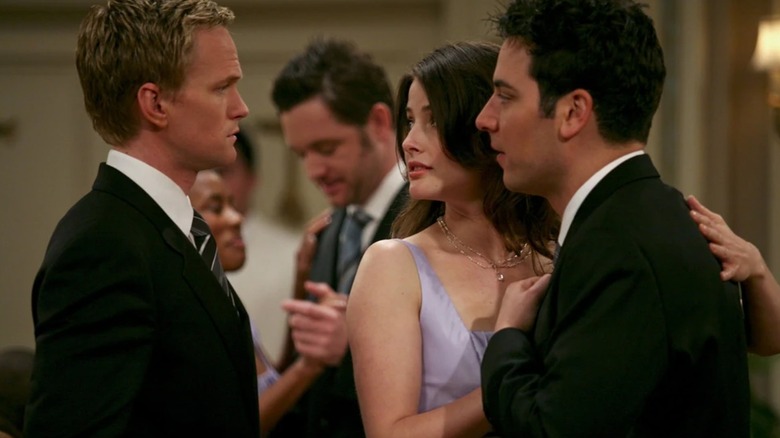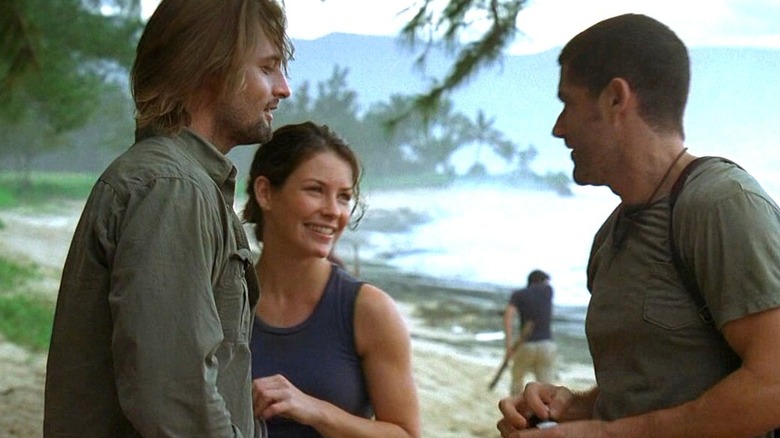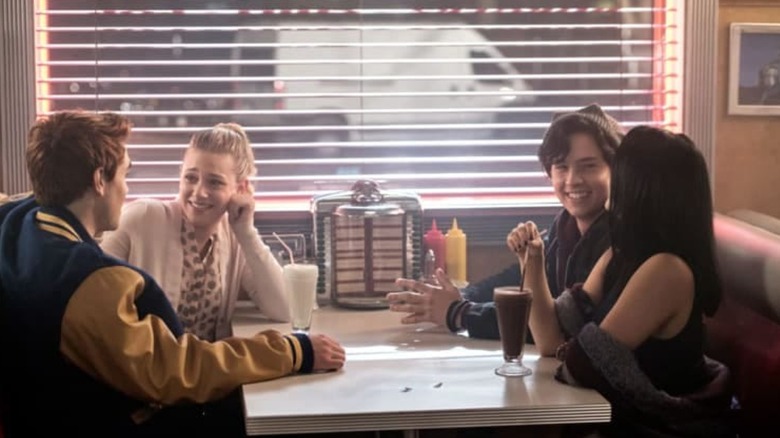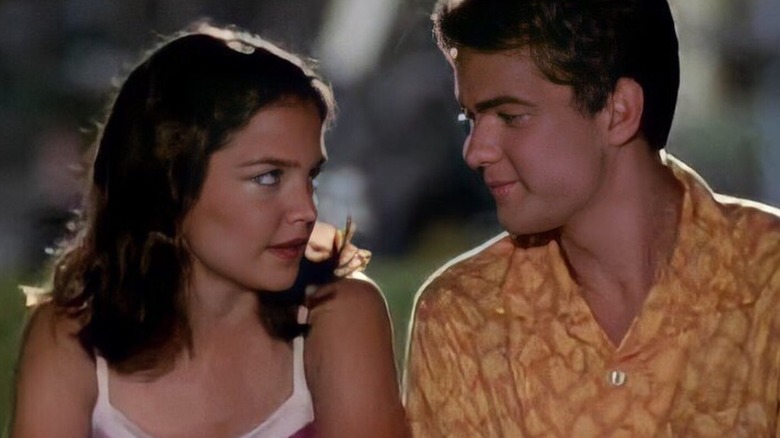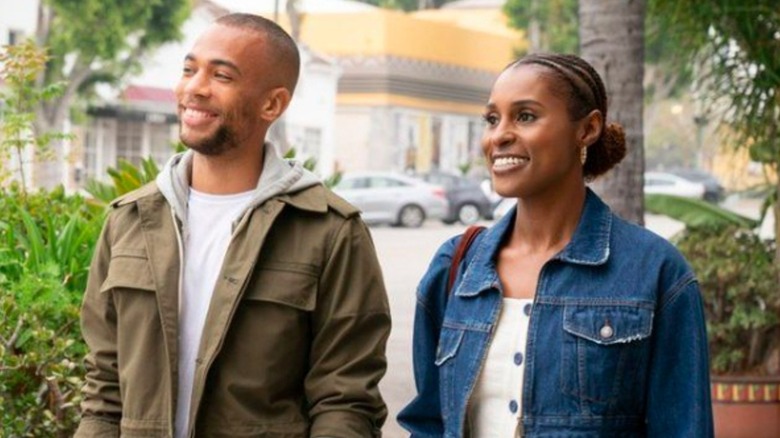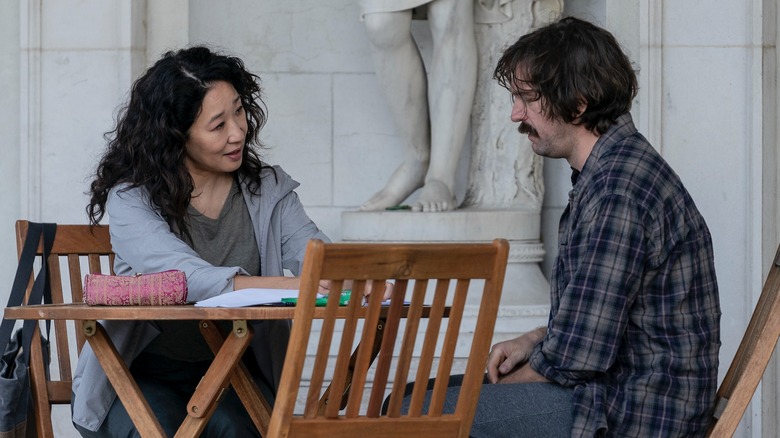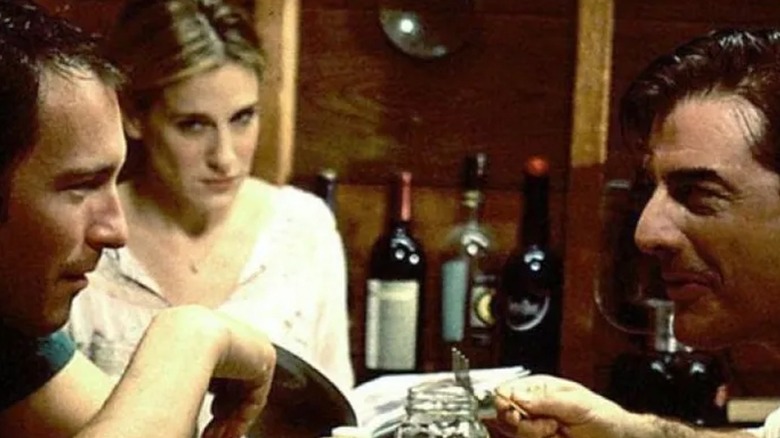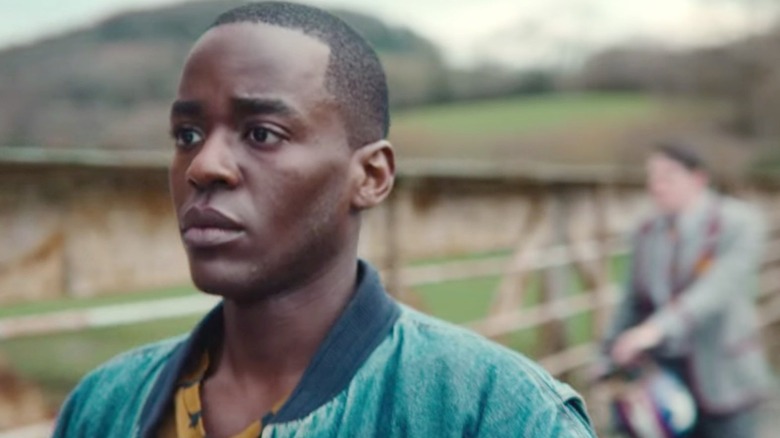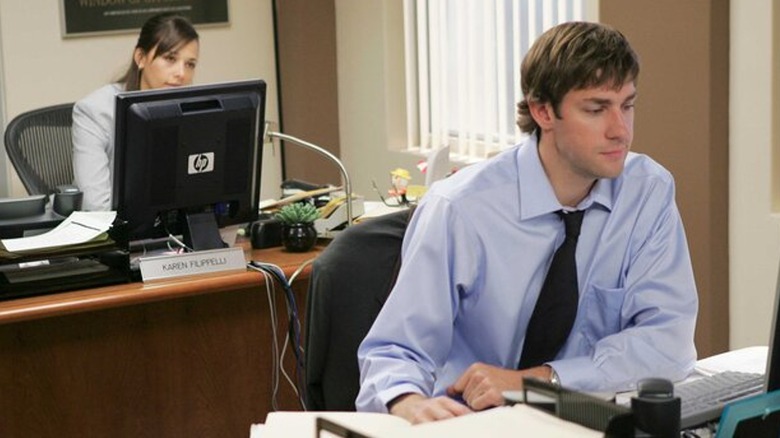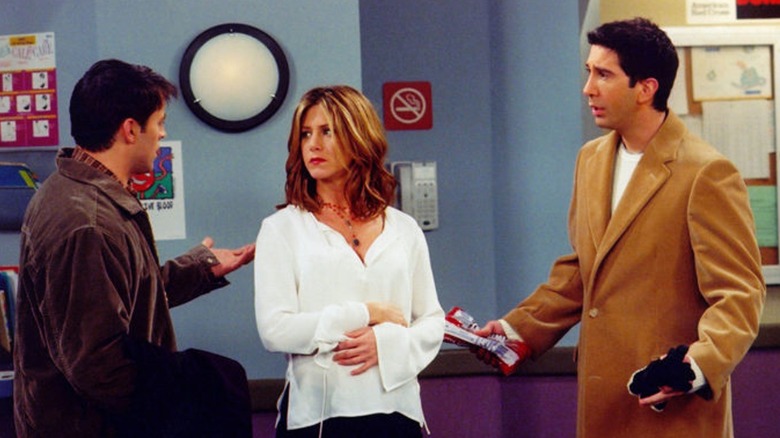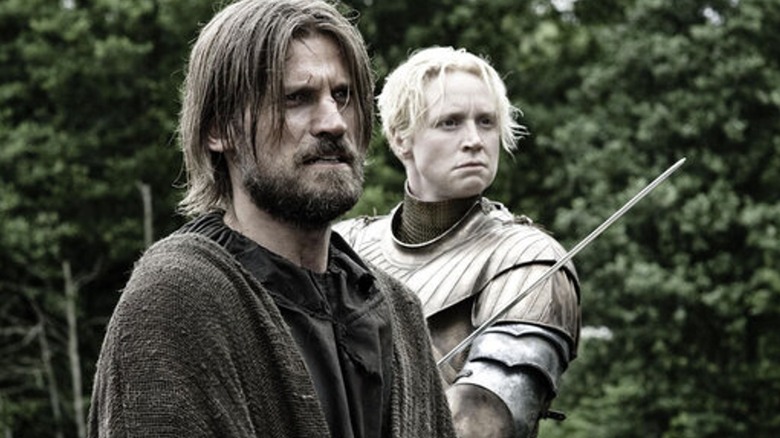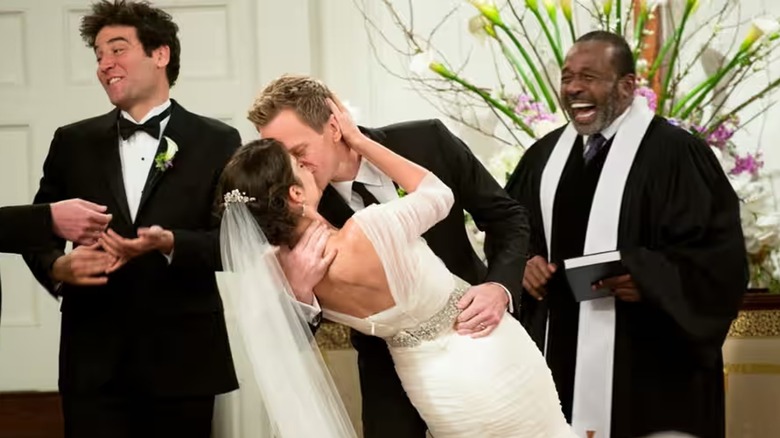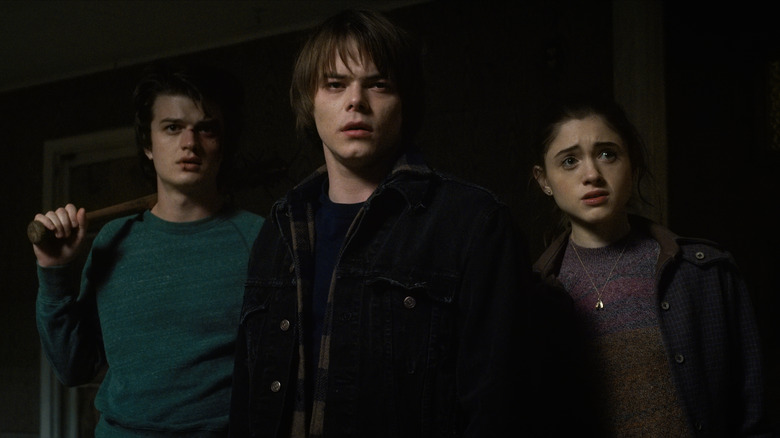TV Love Triangles That Fans Weren't Happy About
Love triangles are a tried-and-tested trope on television. When executed well, they provide fans with a fresh perspective on characters they thought they knew. However, poorly executed love triangles tend to overstay their welcome, leaving fans frustrated with the stagnation they bring to their favorite shows.
The complexities arise when delving into why fans dislike certain love triangles — it's not always as straightforward as you might think. Multiple factors can shape how an audience perceives a love triangle, and often what was initially beloved during a show's run becomes despised upon closer analysis.
In this exploration of TV love triangles, we'll examine those that fans still dislike to this day. We'll dissect the reasons behind these three-character dynamics and understand how fans either lost interest or, in rare cases, outright hated them. These love triangles have defined television as we know it in the past 30 years, so it's only right that they're well-explored. Hopefully, fans will look closer the next time they see them and really come to terms with why they love or hate them.
So without further ado, get ready for a deep dive into the world of complicated TV love triangles.
Lost: Jack, Kate, and Sawyer
"Lost" was a cultural phenomenon in its heyday. But the conception of it was a bit more improvisational than you might expect: Lloyd Braun, ABC's head honcho at the time, had a seed of an idea for a show that was a combination of "Cast Away" and "Survivor." The rest of the work was left to the writers, and "Lost" quickly became a success. But with success comes wildly diverging opinions about just every single facet of the show.
One aspect that caused a small controversy was the love triangle of Sawyer (Josh Holloway), Kate (Evangeline Lilly), and Jack (Matthew Fox). In all fairness, there was a case to be made for Kate choosing either Sawyer or Jack, since they were drastically different people. Jack always made Kate reconsider her trust issues, and Sawyer made Kate feel like she was fine just the way she was. The only problem was that the show went on to milk the storyline for five more seasons.
Some fans started getting weary of the entire love triangle and ended up almost despising every single one of the characters involved. Jack started to seem like he felt he was better than Kate, and Kate using Sawyer as a rebound made him seem quite weak. The love triangle was so exhausting that Lilly cheekily said it was a requirement for her next major role in the "Hobbit" not to be involved in any love triangles.
Riverdale: Archie, Betty, and Veronica
It would be unfair to accuse "Riverdale" of oversimplifying its adaptation of the "Archie" comics by only focusing on the constant breakups and makeups of Archie, Betty, and Veronica. After all, the comics themselves relied heavily on this dynamic, and this overemphasis arguably contributed to the comics losing some of their cultural relevance over time.
When fans were introduced to "Riverdale," it was evident that the teen drama had broader ambitions. While the comics primarily centered on love triangles and juvenile humor, the show ventured into whodunit mysteries and even time travel. However, a recurring issue was the show's persistent reliance on the romantic relationships between Archie (KJ Apa), Betty (Lili Reinhart), and Veronica (Camila Mendes). Some fans hoped that this storyline would be put to rest in the final season, allowing other aspects of the story to be explored.
As the final season approached, it appeared that Archie had made his choice to be with Betty, and Veronica was embarking on a journey of self-discovery as a single woman. However, the show took an unexpected turn when the ending of "Riverdale" hinted that all three characters would engage in a polyamorous relationship, with Jughead (Cole Sprouse) included. Nevertheless, in the end, all three characters would eventually go their separate ways after high school, possibly marking the end of their romantic entanglements.
Dawson's Creek: Joey, Dawson, and Pacey
Before "Riverdale" graced our screens, "Dawson's Creek" set the stage for teen dramas, encompassing everything from college applications to relationship crises. Amidst the show's wild plotlines, the focal point remained the love triangle involving Joey (Katie Holmes), Dawson (James Van Der Beek), and Pacey (Joshua Jackson).
These romances exceeded the audience's expectations at the time. Previous teen shows had set the precedent that there was a lead actor destined for a particular girl, without exploring her agency. These female characters typically served as a prize for the lead character. However, midway through Season 2 of "Dawson's Creek," the show's writers faced a creative crisis and were unsure how to sustain engaging storylines. It was then that writer Greg Berlanti proposed shaking things up by introducing the love triangle.
Berlanti's idea faced resistance and writers required some convincing, with Berlanti even resorting to drawing an actual triangle to seal the deal. The audience didn't immediately embrace this new dynamic, either. Joey bore the brunt of criticism, with multiple fan chatrooms of the 1990s filled with contempt for her character, who dared to develop a relationship with someone other than the titular Dawson. But it's not even up for debate that history vindicated the writers' decision, because not only did they end up using the love triangle to market the show, but their teen romance also ended up being extremely influential to shows in the same genre in the future.
Insecure: Nathan, Issa, and Lawrence
When "Insecure" hit the scene, audiences were well-acquainted with love triangles and their typical trajectories. The show follows Issa (Issa Rae), an early-career Californian navigating friendships, relationships, and career advancements. At the series' outset, Issa is in a relationship with Lawrence (Jay Ellis), but she cheats on him, leading them to go their separate ways for most of the show's run.
As Issa searches for herself, she enters an on-again-off-again relationship with Nathan (Kendrick Sampson), and Lawrence fades into the background. "Insecure" cleverly avoids the trope of the "perfect other guy," portraying Nathan as quite flawed. As Nathan struggled to figure his own life out, there were a significant amount of fans who still considered him a better option than Lawrence. However, Issa gradually distances herself from this relationship and rekindles her love for a now-responsible Lawrence.
A faction of fans, self-dubbed the "Lawrence Hive," welcomed the reunion of the two characters. However, others were infuriated because Lawrence now had a child and other responsibilities. They believed Issa had moved on and matured, suggesting she would be better off with someone other than Lawrence. This time it's not so much the love triangle itself that upset fans, but rather its resolution that left them disappointed.
Killing Eve: Eve, Villanelle, and Niko
"Killing Eve" is adapted from a series of books that revolve around Villanelle's escapades in the British espionage world. BBC America initially brought on Phoebe Waller-Bridge, fresh off her career-defining role as the writer and star of "Fleabag," to pen the show. As its title suggests, "Killing Eve" primarily focuses on Eve Polastri (Sandra Oh), who starts off somewhat distanced from the world of espionage, in a seemingly content marriage with Niko Polastri (Owen McDonnell).
As the series progresses, Eve's cat-and-mouse pursuit of Villanelle (Jodie Comer) takes center stage, and the two slowly develop romantic feelings for each other. Meanwhile, Niko's character remains underdeveloped and becomes estranged from Eve. However, the writers repeatedly attempt to reintegrate Niko into the narrative, even though his presence disrupts the flow of the story. While technically not a love triangle in the traditional sense, the stark power imbalance undermines the stakes, making it feel inconsequential.
Some fans found Niko's continued presence in the show repetitive and unnecessary. Yet, it could be argued that in this particular case, Niko's role was not to be a genuine romantic option for Eve, but rather a symbol of her futile attempts to return to a normal life.
Sex and the City: Carrie, Big, and Aidan
Few shows have managed to capture the essence of a generation's psyche quite like "Sex and the City." During the series' heyday, Carrie Bradshaw (Sarah Jessica Parker) faced the choice between the safe and stable Aidan Shaw (John Corbett) and the exciting Mr. Big (Chris Noth). Ultimately, she chose Mr. Big, a decision that didn't sit well with many fans due to his frequent mistreatment of Carrie.
In the reboot of the show, "And Just Like That," Mr. Big meets his demise in the very first episode. This decision may have been influenced by recent allegations against Noth, but it also aligns with the reboot's theme of reinventing Carrie's main friend group. In a shocking twist, Carrie admits to her friends that she believes being with Mr. Big was a mistake.
Fans reacted to this revelation with relief. For a significant portion of the show's audience, Carrie's choice to be with Mr. Big over Aidan was always seen as a mistake, and they were grateful to the writers for revisiting that decision. Interestingly enough, the real-life inspiration for Carrie Bradshaw, Candace Bushnell, also agrees with this sentiment, suggesting to The Guardian that in real life, Carrie and Big wouldn't have ended up together.
Sex Education: Eric, Adam, and Rahim
Netflix has always been praised for the diversity of its catalog, aiming to cater to a wide range of audiences. However, this approach hasn't always aligned with how underserved fan groups would like their shows to be treated. "Sex Education" is a prime example, especially how it handles the show's main love triangle.
"Sex Education" is a coming-of-age teen drama set in a fictional U.K. high school, focusing on the challenges and sexual exploration of its students. One of the central characters, Eric (Ncuti Gatwa), faces constant bullying from a seemingly homophobic classmate, Adam (Connor Swindells). Despite being in a relationship with Rahim (Sami Outalbali), Eric ends up sharing a kiss with Adam when they're both sent to detention, leading to an enemies-to-lovers storyline. Eventually, Eric breaks up with Rahim in favor of pursuing a relationship with Adam.
Some fans were not pleased with this development, as they felt that Adam was never properly held accountable for his previous mistreatment of Eric. They believed that the show's decision to have Eric choose Adam over Rahim did not address queer-inspired bullying with the seriousness they had hoped for. Furthermore, other viewers didn't even like the trope of homophobic characters being closeted gay people, which added to their disdain for Adam's character in the established love triangle.
The Office: Jim, Karen, and Pam
"The Office" is a beloved series, but it's not without its flaws. One of the significant issues fans have with the show is the hasty resolution of Jim (John Krasinski) and Pam's (Jenna Fischer) romantic storyline. While their relationship doesn't develop immediately, Pam starts the series engaged to her high school sweetheart, and Jim remains on the sidelines for some time. However, when Pam realizes she's unhappy with her engagement and breaks it off, she finds Jim in a healthy relationship with Karen (Rashida Jones).
Karen and Jim ended up having a significantly long arc as lovers, and fans responded positively to their dynamic. To this day, fans can still find YouTube compilations of the characters with comments full of praise for their chemistry. Unfortunately for Karen and Jim's shippers, this relationship was not built to last.
Many fans feel that the show failed to adequately establish why Jim would end his relationship with Karen, as there seemed to be nothing wrong with their connection. This rushed resolution left some viewers with a sense that Karen was treated poorly by both Jim and Pam. While Jim and Pam are ultimately seen as a great couple, the handling of Karen's character felt uninspired and left fans reflecting on her relationship with Jim with warmth, realizing Karen didn't deserve the treatment she received.
Friends: Rachel, Ross, and Joey
A recent report from Time Magazine revealed just how emotionally taxing it was to be a "Friends" writer, so it makes sense that a lot of subplots in the show were not always as well thought out as they could have been. One such subplot was the final season's Joey (Matt LeBlanc), Ross (David Schwimmer), and Rachel (Jennifer Aniston) love triangle. Joey and Rachel had long been teased at that point, with a notable moment being when Joey finally confessed his growing feelings for a then-pregnant Rachel, only to be turned down.
The writers finally decided to give the relationship a chance in the finale of the penultimate season. Joey and Rachel went on to date in a short-lived relationship where the primary purpose seemed to be cheap gags at how awkwardly Ross reacted to them. A vast majority of the fans felt the relationship did not make sense at all.
But arguably, the two were better for each other than Rachel and Ross, who had their own shortcomings in their relationship. However, since the show was coming to a close, it was clear that the Rachel and Joey relationship was too rushed and simply existed to create stakes for Rachel ultimately choosing Ross.
Game of Thrones: Brienne, Cersei, and Jaime
"Game of Thrones" was not exactly what most fans would consider a romantic series. For a time, one of the most uplifting relationships in the entire series was the one between Khal Drogo (Jason Momoa) and Daenerys (Emilia Clarke), which fans know started out quite problematic. But among the many toxic relationships on the show, Jaime (Nikolaj Coster-Waldau) and Cersei (Lena Headey) stood high above the rest, and Jaime was initially willing to do anything for his twin sister-slash-lover.
However, all this changes when Jaime gets kidnapped and loses his hand, and Brienne of Tarth (Gwendoline Christie) is tasked with delivering him back to King's Landing. During their journey, the two form a close bond. Their union is fully realized the night before Jon Snow's (Kit Harington) last stand against the White Walkers, when Jaime knights Brienne and eventually confesses his love for her to his younger brother, Tyrion (Peter Dinklage).
But then the threat of Daenerys going mad and brutally taking over the entire kingdom becomes imminent. This prompts Jaime to revert to his old ways and run back to Cersei to be by her side, loyal to the end.
Brienne tries to stop Jaime by convincing him that he's not as bad as Cersei and doesn't deserve what's coming to her. However, Jaime disagrees and insists that he's just as bad as Cersei. Many fans were ultimately disappointed with this development because, at that point, Jaime had clearly gone through a significant redemption arc, and this ending essentially reversed it all.
How I Met Your Mother: Ted, Robin, and Barney
The love triangle between Ted (Josh Radnor), Robin (Cobie Smulders), and Barney (Neil Patrick Harris) in "How I Met Your Mother" is one that some fans believe ultimately ruined the show. This sentiment is widely held because the show's premise was always centered on Ted eventually meeting the mother of his children, with viewers having watched him recount his late 20s and early 30s for the better part of a decade.
When fans finally see Ted meet his wife, she exceeds all expectations. She's funny, charming, and has great chemistry with Ted. However, the show unexpectedly kills her off and shifts its focus to the Ted, Robin, and Barney love triangle. In the final episodes, it is revealed that Robin and Barney divorce, Robin distances herself from the friend group, and Ted is still interested in Robin.
The problem here was that fans had become more invested in Robin's relationship with Barney than in rekindling Ted and Robin's relationship. The show's undoing was that this ending failed to meet fans' expectations, leaving them not only surprised but also disappointed with where the characters in the love triangle ended up in "How I Met Your Mother."
Stranger Things: Nancy, Jonathan, and Steve
Netflix immediately recognized the potential of "Stranger Things." The Duffer brothers, relatively unknown TV producers at the time, were steadily making their way up the ranks when an opportunity finally aligned with their TV show idea. After facing rejection from over a dozen other networks, Netflix emerged as the platform willing to bring their concept to life. The show quickly became a hit with fans, capturing the nostalgia from the decade the show is set in while also offering an original storyline — a combination that resonated well with viewers. However, with a dedicated fanbase comes intense scrutiny.
"Stranger Things" has faced backlash on various fronts, with the latest being fans' disapproval of Steve's (Joe Keery) enduring affection for Nancy (Natalia Dyer). In the earlier seasons, he is portrayed as somewhat of a bully, and while his treatment of Jonathan (Charlie Heaton) may not be entirely unjustified, many viewers still see Jonathan as a better romantic option. Nancy herself eventually chooses Jonathan over Steve (which most fans had no issue with), and Steve subsequently undergoes significant character growth. However, Steve's unwavering love for Nancy, despite her clear move away from their relationship, has left some fans feeling uncomfortable due to its one-sided nature. Moreover, some fans have expressed dissatisfaction with Nancy consistently being portrayed as unfaithful in the series.
